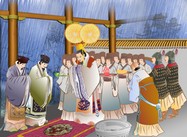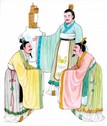Culture
-
The Emperor Yao
2012-08-31 Emperor Yao’s concern for his people won him great respect. He lived a simple life and put the people’s well-being as his highest priority. He always looked inward first when encountering difficulties. Emperor Yao was loved deeply by his people. During his reign the people’s lives got better and better.
Emperor Yao’s concern for his people won him great respect. He lived a simple life and put the people’s well-being as his highest priority. He always looked inward first when encountering difficulties. Emperor Yao was loved deeply by his people. During his reign the people’s lives got better and better. -
The Rescue of the Dragon Princess, Part III of III
2012-08-28 The dragon princess, third daughter of the Dong Ting Lake Dragon King, was married to the dragon prince of the Jinghe River, a ruthless, cruel, unfeeling and obstinate dragon that mistreated the princess and exiled her from the palace.
The dragon princess, third daughter of the Dong Ting Lake Dragon King, was married to the dragon prince of the Jinghe River, a ruthless, cruel, unfeeling and obstinate dragon that mistreated the princess and exiled her from the palace. -
The Rescue of the Dragon Princess, Part II of III
2012-08-21 The dragon princess, third daughter of the Dong Ting Lake Dragon King, was married to the dragon prince of the Jinghe River, a ruthless, cruel, unfeeling and obstinate dragon who mistreated the princess and exiled her from the palace. Liu Yi, a young scholar, heard the princess’s sorrowful cry and took pity on the damsel in distress.
The dragon princess, third daughter of the Dong Ting Lake Dragon King, was married to the dragon prince of the Jinghe River, a ruthless, cruel, unfeeling and obstinate dragon who mistreated the princess and exiled her from the palace. Liu Yi, a young scholar, heard the princess’s sorrowful cry and took pity on the damsel in distress. -
The Rescue of the Dragon Princess, Part I of III
2012-08-17 Throughout the ages, Chinese legends have been passed down from generation to generation and, at times, these stories have taken on a life of their own as new events would happen and characters would appear. The legend of Liu Yi delivering a letter for the dragon princess has grown in popularity since it was first heard in ancient China.
Throughout the ages, Chinese legends have been passed down from generation to generation and, at times, these stories have taken on a life of their own as new events would happen and characters would appear. The legend of Liu Yi delivering a letter for the dragon princess has grown in popularity since it was first heard in ancient China. -
Stories from Ancient China: Emperor Shun Inspired by Example
2012-08-14 Many centuries preceding the teachings of Confucius in the 5th century B.C., Emperor Shun was known as the founder of China’s social rules in the family and among the various members of society. He said there should be affection between father and son, justice between a monarch and his ministers, duty between husband and wife, respect for ones’ elders, and trust among friends.
Many centuries preceding the teachings of Confucius in the 5th century B.C., Emperor Shun was known as the founder of China’s social rules in the family and among the various members of society. He said there should be affection between father and son, justice between a monarch and his ministers, duty between husband and wife, respect for ones’ elders, and trust among friends. -
Stories from Ancient China: Great Yu Controlled the Flood (B.C. 2205)
2012-08-10 After Emperor Shun, Yu became the next Emperor (B.C. 2205). Yu was one of descendants of the Yellow Emperor. Being known for his kindness and talent, Yu was recommended by many ministers as the most capable person to find ways to control flooding. He was then appointed by Emperor Shun to take the responsibility of flood-control.
After Emperor Shun, Yu became the next Emperor (B.C. 2205). Yu was one of descendants of the Yellow Emperor. Being known for his kindness and talent, Yu was recommended by many ministers as the most capable person to find ways to control flooding. He was then appointed by Emperor Shun to take the responsibility of flood-control. -
Stories from Ancient China: Compassionate Tang Founded the Shang Dynasty
2012-08-07 In the first five years of Tang’s reign, there were several droughts and all the rivers dried up. Tang ordered golden coins to be made and distributed to poor families who had been forced to sell their children. He intended for them to use this money to buy their children back. The droughts nonetheless continued.
In the first five years of Tang’s reign, there were several droughts and all the rivers dried up. Tang ordered golden coins to be made and distributed to poor families who had been forced to sell their children. He intended for them to use this money to buy their children back. The droughts nonetheless continued. -
The Virtue of Tolerance
2012-08-03 Cui Lo was appointed the deputy prime minister, and was highly regarded and respected by Emperor Shizong. Cui liked to promote talent. He recommended Xing Shao to the Emperor as staff in the prime minister’s office, and also as head of covert operations. Because of Cui’s recommendation, Xing was recruited. Xing later won the Emperor’s trust and high regard.
Cui Lo was appointed the deputy prime minister, and was highly regarded and respected by Emperor Shizong. Cui liked to promote talent. He recommended Xing Shao to the Emperor as staff in the prime minister’s office, and also as head of covert operations. Because of Cui’s recommendation, Xing was recruited. Xing later won the Emperor’s trust and high regard. -
Stories from Ancient China: The Legend of Mulan
2012-07-24 As Mulan thought of her father going to war, she knew he would likely die, and die in vain. But if he refused to go, he would be branded as being unpatriotic. Mulan’s brother was still too young to enlist, so Mulan made up her mind to disguise herself as a man, and take her father’s place in the army. At first, Mulan’s parents were against her plan, but Mulan persisted.
As Mulan thought of her father going to war, she knew he would likely die, and die in vain. But if he refused to go, he would be branded as being unpatriotic. Mulan’s brother was still too young to enlist, so Mulan made up her mind to disguise herself as a man, and take her father’s place in the army. At first, Mulan’s parents were against her plan, but Mulan persisted. -
Stories from Ancient China: Yi Yin, Great Prime Minister of the Shang Dynasty
2012-07-20 Yi Yin was the first prime minister of the Shang Dynasty, serving for about 50 years. He was known for his kindness, good knowledge of ruling, and great cooking skill. As a child, he learned cooking from his father, Yi Yin learned many other things. He was very hard-working and became a very talented young man. He soon became the tutor for the princess of the Xin Kingdom.
Yi Yin was the first prime minister of the Shang Dynasty, serving for about 50 years. He was known for his kindness, good knowledge of ruling, and great cooking skill. As a child, he learned cooking from his father, Yi Yin learned many other things. He was very hard-working and became a very talented young man. He soon became the tutor for the princess of the Xin Kingdom. -
Stories from Ancient China: King Wen of the Zhou Kingdom Rules by Virtue
2012-07-17 King Wen of the Zhou kingdom (BC 1152 – BC 1056) from the Shang Dynasty was known for ruling by means of virtue and kindness. He taught people to be honest, respectful to God, and virtuous. He often said: "The king shall rule people with benevolence; officials shall manage people with care; children shall respect parents with filial piety; parents shall raise children with love; and the people shall associate with one another in good faith."
King Wen of the Zhou kingdom (BC 1152 – BC 1056) from the Shang Dynasty was known for ruling by means of virtue and kindness. He taught people to be honest, respectful to God, and virtuous. He often said: "The king shall rule people with benevolence; officials shall manage people with care; children shall respect parents with filial piety; parents shall raise children with love; and the people shall associate with one another in good faith." -
Stories from Ancient China: The Tattoo on Yue Fei’s Back
2012-07-10 Yue Fei (1103-1142) was a famous general in the Song Dynasty and a national hero. He was best known for defending the Southern Song against the Jin invaders. He was also a noted strategist, but it’s not his military talent that made the most profound impact on the Chinese people. His loyalty and devotion to the country became a model for Chinese youth.
Yue Fei (1103-1142) was a famous general in the Song Dynasty and a national hero. He was best known for defending the Southern Song against the Jin invaders. He was also a noted strategist, but it’s not his military talent that made the most profound impact on the Chinese people. His loyalty and devotion to the country became a model for Chinese youth. -
Stories from Ancient China: Jiang Ziya, The Advisor Who Helped Establish the Zhou Dynasty
2012-07-06 Jiang Ziya (BC 1152) was known as the good adviser of King Wen of the Zhou Kingdom. At the age of 32, Jiang Ziya went up a mountain where he cultivated Daoism—he changed himself by studying and living in accordance with Daoist teachings. At that time, the Shang Dynasty was in a continuous state of war, and he went to the mountain in part to avoid the war.
Jiang Ziya (BC 1152) was known as the good adviser of King Wen of the Zhou Kingdom. At the age of 32, Jiang Ziya went up a mountain where he cultivated Daoism—he changed himself by studying and living in accordance with Daoist teachings. At that time, the Shang Dynasty was in a continuous state of war, and he went to the mountain in part to avoid the war. -
Stories from Ancient China: King Wu, the Zhou Dynasty’s First Emperor, Respected Heaven
2012-07-03 King Wu of Zhou was the son of King Wen of the Zhou Kingdom. In the twelfth year after King Wu succeeded to the throne, he started the Zhou Dynasty (B.C. 1122–B.C. 222). The Zhou Dynasty was an important period of Chinese history. 37 emperors ruled for nine hundred years before the Zhou Dynasty was conquered by the Qin Dynasty in 221 B.C.
King Wu of Zhou was the son of King Wen of the Zhou Kingdom. In the twelfth year after King Wu succeeded to the throne, he started the Zhou Dynasty (B.C. 1122–B.C. 222). The Zhou Dynasty was an important period of Chinese history. 37 emperors ruled for nine hundred years before the Zhou Dynasty was conquered by the Qin Dynasty in 221 B.C. -
Stories from Ancient China: Prime Minster Advises the Duke, Even After Death
2012-06-16 In the Spring and Autumn Period (770 -- 476BC), there was a sage in State of Wei, whose name was Qu Yuan, also known as Qu Boyu. He was a man of good character and talent. Although he was generous, honest, loyal and forgiving, the Duke Ling of Wei did not give him an important position in the royal court and instead, the Duke relied upon a man named Mi Zixia.
In the Spring and Autumn Period (770 -- 476BC), there was a sage in State of Wei, whose name was Qu Yuan, also known as Qu Boyu. He was a man of good character and talent. Although he was generous, honest, loyal and forgiving, the Duke Ling of Wei did not give him an important position in the royal court and instead, the Duke relied upon a man named Mi Zixia.



 more ...
more ...